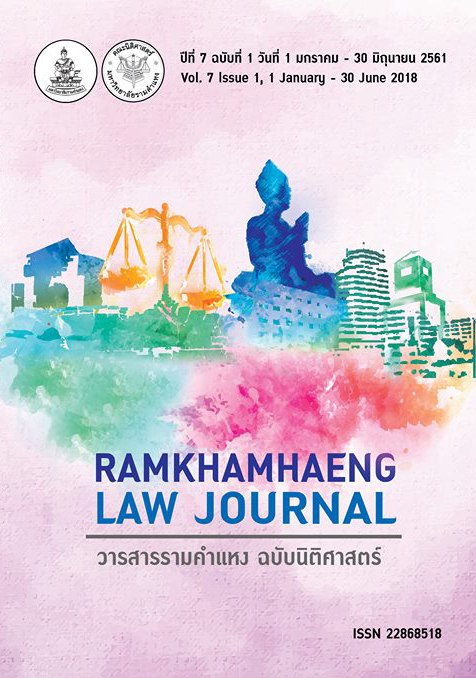แนวทางส่งเสริมสำนึกทางกฎหมายของประชาชนต่อการมีส่วนร่วมในการตรวจสอบการทำงาน ของเทศบาลเมืองสีคิ้ว จังหวัดนครราชสีมา
Main Article Content
Abstract
The purpose of this research is to discover the role of the law as it relates to public participation in the monitoring of local administrations, people’s legal consciousness, and the provision of guidelines for the enhancement of people’s legal consciousness in Sikhiu Town Municipality, Nakhon Ratchasima province. This qualitative research is a phenomenon study. The data was collected through in-depth interviews with eighteen people, who were divided into five groups and a focus group. The information gathering was done by six people who had previous experience in this type of activity. A content analysis was employed to analyze the data. The results are summarized below.
The law on public participation in the monitoring of the local administration has the smallest role of all five types of participation. Concerning the nature of people’s legal consciousness, the results show that all of the leaders of the community have greater participation in the monitoring than does the general population. There are three methods in which people in general can express their legal consciousness: 1) by legal means; 2) by non-legal means with an element of participation in the monitoring; and 3) by non-legal means without any element of participation.
The guidelines for the enhancement of people’s legal consciousness consist of two elements. Firstly, the local government should continuously and thoroughly inform the people of what the local government will do through its sound-broadcasting. Secondly, the local government should educate people about the duties of the local government and programs for public participation. This effort must start with the local leaders, because they have an important role in the community, and they are in contact with both the local office and the community at large. The process of educating people can be initiated by setting up training projects for local administrations on the subject of providing courses to the public relating to public participation. These could be organized by the local administration itself, or in collaboration with other local offices in nearby areas. Training projects or workshops can eventually be arranged for ordinary people.
Article Details
References
บัณฑิต พรหมรักษ์. “การมีส่วนร่วมของประชาชนในการเมืองการปกครองท้องถิ่น ขององค์การบริหารส่วนตำบลภูคา อำเภอปัว จังหวัดน่าน.” วิทยานิพนธ์รัฐประศาสนศาสตร-มหาบัณฑิต, มหาวิทยาลัยราชภัฏอุตรดิถต์, 2551.
มงคล เจริญจิตต์. “การรับรู้กฎหมายของผู้ใช้แรงงานในกิจการขนาดย่อม.” วิทยานิพนธ์นิติศาสตร-มหาบัณฑิต, มหาวิทยาลัยเชียงใหม่, 2551.
เศรษฐไชย หทัยวรรธน์. “การมีส่วนร่วมของประชาชนในการจัดทำแผนพัฒนาท้องถิ่นขององค์การบริหารส่วนตำบลน้ำพี้ อำเภอแสนขัน จังหวัดอุตรดิตถ์.” วิทยานิพนธ์รัฐประศาสนศาสตร-มหาบัณฑิต, มหาวิทยาลัยราชภัฏอุตรดิตถ์, 2551).
สถาบันพระปกเกล้า. ประวัติความเป็นมา [Online]. Available URL: https://kpi.ac.th/ประวัติความเป็นมา.html, 2560 (ธันวาคม, 28).
__¬¬¬¬¬¬____. เกี่ยวกับรางวัลพระปกเกล้า [Online]. Available URL: https://sv1.bizidea.co.th/
team/fon/award.kpi /#home-section, 2560 (ธันวาคม, 28).
. เทศบาลเมืองสีคิ้ว [Online]. Available URL: https://sv1.bizidea.co.th/team/ fon/ award.kpi/award-searchdetail/61, 2560 (ธันวาคม, 28).
สุรชัย ชอบชื่น. “การมีส่วนร่วมกับองค์การบริหารส่วนตำบลในการพัฒนาท้องถิ่นของประชาชนในจังหวัดนครราชสีมา.” วิทยานิพนธ์สังคมศาสตร์เพื่อการพัฒนา, มหาวิทยาลัยราชภัฏ-นครราชสีมา, 2551.
Duncan, Kennedy. “Toward an Historical Understanding of Legal Consciousness: the case of Classical Legal Thought in America, 1850-1940.” Research in Law and Sociology 3 (1980): 22.
Engel, David M. Code and Custom in a Thai Provincial Court. Tucson: University of Arisona Press, 1978.
Marc, Hertogh. “A ‘European’ Conception of Legal Consciousness: Rediscovering Eugen Ehrlich.” Journal of Law and Society 31, 4 (2004): 457.
M. Engel, David and Munger, Frank W. Rights of Inclusion: Law and Identity in the Life Stories of Americans with disabilities. Chicago: The University of Chicago Press, 2003.
S. Silbey, Susan. “After Legal consciousness.” Annual Review of Law and Social Science 1 (2005): 323.

